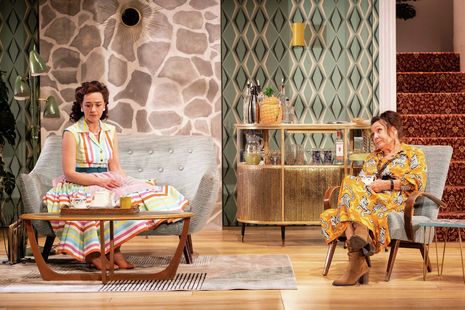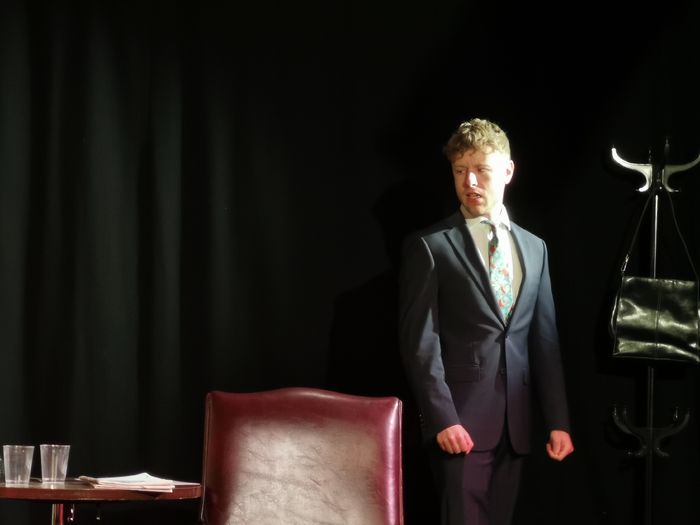‘Home, I’m Darling’: topsy-turvy play has trouble finding its footing
Compelling performances and fantastic design work can’t quite help the intriguing premise’s stagnation

Laura Wade uses fifties nostalgia as her route to interrogate life as a woman now and to show how far we have (and haven’t) come. Judy (Jessica Ransom) and Johnny (Neil McDermott) are a couple. They have chosen to commit, wholeheartedly, to gender roles of the 1950s: Judy is the “perfect” housewife, Johnny is the breadwinner. She takes his slippers off after a day at work, he sips on the gin and lemon. Their friends Fran (Cassie Bradley) and Marcus (Steve Blacker Barrowman) strive to be as authentically fifties as Judy and Johnny. But in this desire for the “perfect” husband-wife set-up is the bubbling undercurrent that perfection can tip, easily, into dysfunction.
“Every swipe of the butter across the toast becomes a choreographed routine”
Mr. Sandman, bring me a dream plays… a woman in the audience mouths along. Fittingly wishful, we’re plunged into Judy and Johnny’s dream-life, a Barbie life-in-the-dreamhouse. Using stylised perfection, directors Tamara Harvey and Hannah Noone ensure Judy’s every gesture appears like a puppet on strings. Buttering toast becomes a choreographed routine: it’s clear that this is not her first breakfast-preparing rodeo. Beginning with this heavy-handed housewife parody, Judy’s RP sing-song voice screams out: I AM PLAYING A ROLE. The dark underbelly of Judy and Johnny’s “appallingly happy” life plays out neatly in performance. Starting with the sound design by Tom Gibbons, the non-diegetic Mr. Sandman eerily breaks apart, crumbling before diegetically arriving on Judy’s radio. Continued visually, the set is flawless to the point that it feels too neat and unspoiled, a clue that their perfect world doesn’t last very long.
Anna Fleischle (set and costume designer) has left no corner neglected in her design. Like a doll’s house, its upstairs is made of images plastered onto flats, with their perspectives slightly off. These visibly two-dimensional attempts at three-dimensional rooms perpetuate the very facade that this home represents. The opening scene ends with the gag of Judy bringing out her laptop, a crack in the facade. Alarmingly discordant in this meticulously crafted world, Wade earns her mixed-up title with this simple image of Judy on her Macbook.
“Wade’s actual script had holes which needed to be plugged”
Home, I’m Darling revels in symbolism and stylisation so that glitches in their slick routines represent bigger fissures in the couples’ lives. Scene transitions are jive sequences timed to perfection. But, when Marcus loses his job for sexually assaulting his personal assistant, these transitions disappear. The couple can no longer (symbolically) keep in step with each other. Lines felt pre-prepared by the characters, delivered as though reading a script. But, for all this ironic delivery, Wade’s actual script had holes which needed to be plugged. In Wade’s world, it’s a given that these “Jivestock” festival fans would live in the same neighbourhood. The characters themselves can’t decide what this charade is all about: whether experiment, arrangement, performance, delusion, fantasy, or cartoon.
The closest we get to a useful answer is the brief normality of the main couple just before they start to entertain the delusion and turn into a Doris Day and Rock Hudson tribute act. This post-interval scene of their pre-fifties life finally lets us into the believability of their relationship as one that is loving. Ransom awes in a complete transformation into a youthful and excited Judy - making up for her otherwise ungraspable front.
“This was didactic soliloquy, the focus on Wade’s political message rather than fixing the mother-daughter bond”
This glimpse behind the characters’ masks needed to be given more space to breathe. Instead, symbolism trumps believability and we’re left with Judy’s mum, Sylvia (Diane Keen), as the only believable character. Sylvia, who lives firmly in the present, had the opportunity to clinch the hearts of the audience and Judy, with her monologue on what the ’50s was really like. But, the writing felt too organised. Rather than an emotional appeal to her daughter, this was didactic soliloquy, the focus on Wade’s political message rather than fixing this mother-daughter bond. It’s not the audience who need to be told that the fifties was bad for anyone who wasn’t a “straight, white man”: we aren’t the ones living in make-believe. Despite the impassioned delivery, the on-stage consequences were lacklustre. Judy doesn’t take a word in and so this moment is left as a preachy speech. And so, this production left me unsure as to who I should sympathise with. Since the exaggerated stereotyping at the start, I was waiting and waiting for character progression — to finally see their reality under their performance.
Perhaps this show wasn’t really for young people. Sylvia’s retort to Judy’s question (“Why isn’t my work valued?”) slammed the audience into breathless silence: “because men don’t do it”. But to me it felt like a hackneyed take on feminist discourse. I wanted more specifics: a deep-dive into why Judy’s middle-class performance of housework is unsettling, why her choice to act this role sits uncomfortably with the knowledge that many women don’t choose. The play’s charm lies in its glorious revelling in this dated palate, while being switched on to the realities of being a woman seventy years ago too. For those for whom the fifties may be remembered with its sugar-coated nostalgia and also for its post-war host of sexist problems, this play will no doubt resonate more.
Though having Johnny make breakfast completes the play with a neatly cyclical, role-reversal wink, this return to the start emphasises the play’s stagnation. Judy and Johnny are back to skipping and prancing, fake smiles plastered on their faces, with Judy dressed as an air-hostess off to perform some unspecified job. Times have changed but we never get access to why Judy is like this, so unable to let her fifties dreams go (even if she does go back to work). I only wish Wade had got at the why.
Home, I’m Darling is playing at the Cambridge Arts Theatre from Tuesday 2nd to Saturday 6th May, 7:30pm, with matinees on the 4th and 6th.
 Interviews / You don’t need to peak at Cambridge, says Robin Harding31 December 2025
Interviews / You don’t need to peak at Cambridge, says Robin Harding31 December 2025 News / Unions protest handling of redundancies at Epidemiology Unit30 December 2025
News / Unions protest handling of redundancies at Epidemiology Unit30 December 2025 Comment / What happened to men at Cambridge?31 December 2025
Comment / What happened to men at Cambridge?31 December 2025 Features / ‘Treated like we’re incompetent’: ents officers on college micromanagement30 December 2025
Features / ‘Treated like we’re incompetent’: ents officers on college micromanagement30 December 2025 Theatre / We should be filming ADC productions31 December 2025
Theatre / We should be filming ADC productions31 December 2025








